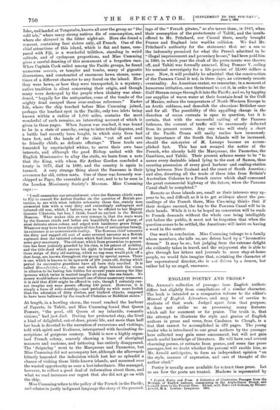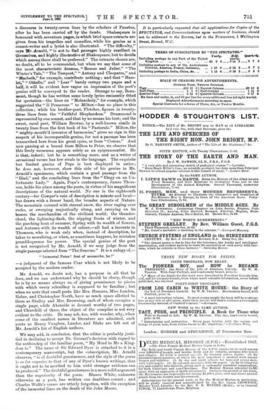ENGLISH POETRY AND PROSE.*
MR. ARNOLD'S collection of passages from English authors differs but slightly from compilations of a similar character. The hook is intended as a companion volume to the editor's Manual of English Literature, and may be of service to students of that work. Judged apart from that purpose, it does not strike us as possessing many features which call for comment or for praise. The truth is, that the attempt to illustrate the style and genius of English authors in prose and verse, from Caedmon to Clough, is a feat that cannot be accomplished in 470 pages. The young reader who is introduced to our great authors by the passages here collected may gain some amusement, but will not gain much useful knowledge of literature. He will have read several charming poems, or extracts from poems, and some fine prose passages, but we doubt whether the perusal will enable him, as Mr. Arnold anticipates, to form an independent opinion "on the style, manner of expression, and cast of thought of the author cited."
Poetry is usually more available for extract than prose. Let us see how the poets are treated. Marlowe is represented by
• English Poetry and Prose. A Collection of Illustrative Passages from the Writings of English Authors, commencing in the Anglo-Saxon Period, and brought down to the Present Time. Edited, with Notes and Indexes, by Thomas Arnold, M.A. London : Longman!. IBM a discourse in twenty-seven lines by the scholars of Faustus, after he has been carried off by the fiends. Shakespeare is honoured with seventeen pages, in which brief space extracts are given from his tragedies and comedies, while his genius as a sonnet-writer and a lyrist is also illustrated. " The difficulty," says lir. Arnold, 4" is not to find passages highly excellent in themselves, and highly illustrative of Shakespeare, but to decide Which among these shall be preferred." The extracts chosen are, no doubt, all to be commended, but when we say that some of the most characteristic dramas, " Romeo and Juliet," " The Winter's Tale," " The Tempest," " Antony and Cleopatra," and "Macbeth," for example, contribute nothing ; and that " Ham- let," " Othello," and " Lear " barely occupy two pages and a half, it will be evident how vague an impression of the poet's genius will be conveyed to the reader. Strange to say, Beau- mont, though he has written some lovely lyrics eminently fitted fer quotation—the lines on "Melancholy," for example, which suggested the " U Penseroso " to Milton—has no place in this collection ; while his brother-poet, Fletcher, figures in twenty- three lines from the "Faithful Shepherdess." Drummond is represented by one sonnet, and that by no means bis best; and the sweet, rural poet, William Browne, by a well-known simile in twenty lines from the first book of his "Pastorals." Milton, the " mighty-mouth'd inventor of harmonies," gives no sign in this respect of his incomparable genius, for not a passage has been transcribed here from his great epics, or from " Comus." And now passing at a bound from Milton to Prior, we observe that this lively verseman appears solely as an epigrammatist. He is that, indeed ; but he is something more, and as a writer of occasional verses has few rivals in the language. The exquisite but limited genius of Pope is best displayed in satire ; he does not, however, show this side of his genius in Mr. Arnold's specimens, which contain a good passage from the "Iliad," and the concluding lines from the "Elegy on an Un- fortunate Lady." Again, Pope's contemporary, James Thom- son, holds his place among the poets, in virtue of his magnificent descriptions of the natural world. No one in the eighteenth century—for Cowper's vein of description is minute and local— has drawn with a firmer hand, the broader aspects of Nature. The mountain covered. with eternal snow, the river raging over rocks, or sweeping majestically along, and carrying on its bosom the merchandise of the civilised world; the thunder- cloud, the lightning-flash, the nipping frosts of winter, and the parching-heat of summer, Spring with its wealth of flowers, and Autumn with its wealth of colour,—all bad a laureate in Thomson, who is weak only when, instead of description, he takes to moralising, or when, as sometimes happens, he mistakes grandiloquence for power. The special genius of the poet is not recognised by Mr. Arnold, if we may judge from the single passage selected from "The Seasons." It is a eulogy of,— "Immortal Peter ! first of monarchs, he !"
—a judgment of the famous Czar which is not likely to be accepted by the modern reader.
Mr. Arnold, we doubt not, has a purpose in all that he does, and we can understand why he should be chary, though he is by no means always so, of giving prominence to pieces with which --every schoolboy is supposed to be familiar ; but when we note that small poets like Mrs. Hemans, Miss Landon, Heber, and Christopher North, have as much space allotted to them as Shelley and Mrs. Browning, each of whom occupies a single page, while Akenside is deemed worthy of two pages, and Churchill of three, the object of the compiler is not very evident to the critic. He may ask, too, with wonder, why, when some of the smallest names in literature are admitted, such poets as Henry Vaughan, Landor, and Blake are left out of Mr. Arnold's list of English authors.
We may add, in conclusion, that the editor is probably justi- fied in declining to accept Dr. Grosart's decision with regard to the authorship of the familiar poem, " My Mind to Me a King- dom is." The name of Sir Edward Dyer is attached to it in a contemporary manuscript, but the subscription, Mr. Arnold observes, "is of doubtful genuineness, and the style of the poem is so far superior to that of any of Dyer's known writings, that it ought not to be ascribed to him until stronger evidence can be produced." The doubtful genuineness is a more solid argument than the superiority of the poem. Blanco White, unknown otherwise as a poet, has written one deathless sonnet ; and Charles Wolfe's verses are utterly forgotten, with the exception of the immortal lines on the death of Sir John Moore.















































 Previous page
Previous page